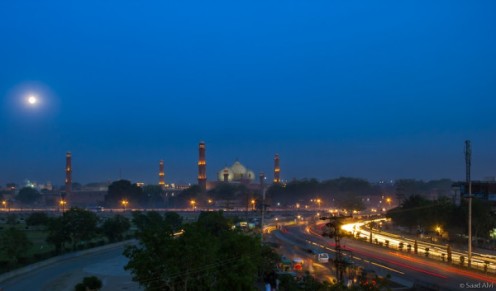This article was written by Farha Noor for Coldnoon.com
Ae roshnion ke shahar
Kaun kahe kis simt hai teri roshnion ki raah
Har jaanib be-noor khadi hai hijr ki shaharpanaah
Thak-kar har soo baith rahi hai shouq ki maand sipaah
Oh city of lights
Who could say in what direction is the road to your lights?
On every side stand the unlit city-walls of banishment:
Weary, in every direction, the exhausted army of ardour is sitting (Faiz Ahmed Faiz, trans. by V. G. Kiernan)
I went to Lahore in search of a dead woman – a woman who belonged, more in death than in life, to this city she decided to make her own. I went to know about the unknown, to throw some light on the darkness of her past. In belonging to a city in death, one often imparts life to the city itself. My journey to Lahore made me realise much more than I could imagine: that the search for the dead can often lead one to many more deaths, to being trapped within the apparition of an illuminated city that thrives on darkness. For me, Lahore now translates into an enigmatic sense of loss. It is a loss that is not mine, that would never be mine, that could never have been mine. I am an outsider, a mere traveller. Yet, it is this loss that reaches out, connecting dots on the map of Lahore, darker than any other line. It is this loss that I have gained. It is this loss I accidentally inherited as I went astray in the glittering alleys and gardens of the ruining city I thought I escaped. Continue reading


 LAHORE: Rafi Peer Theatre Workshop on Tuesday announced holding its annual Mystic Music Sufi Festival 2009 from April 30 to May 2.
LAHORE: Rafi Peer Theatre Workshop on Tuesday announced holding its annual Mystic Music Sufi Festival 2009 from April 30 to May 2. with only two chairs and a bed with spider webs visible all around. No sign or tribute on the entire street for those who lived and visited this room-cum-house. Yet, it is this house that witnessed one of the giants of Sufi tradition, Shah Hussain, as well as the legendary Punjabi poet of the 20th century Ustad Daman.
with only two chairs and a bed with spider webs visible all around. No sign or tribute on the entire street for those who lived and visited this room-cum-house. Yet, it is this house that witnessed one of the giants of Sufi tradition, Shah Hussain, as well as the legendary Punjabi poet of the 20th century Ustad Daman. LAHORE: Faiz Amman Mela was held at an open-air theatre in the Jinnah Garden on Saturday amidst the bustle of more than 2,000 people.
LAHORE: Faiz Amman Mela was held at an open-air theatre in the Jinnah Garden on Saturday amidst the bustle of more than 2,000 people.








